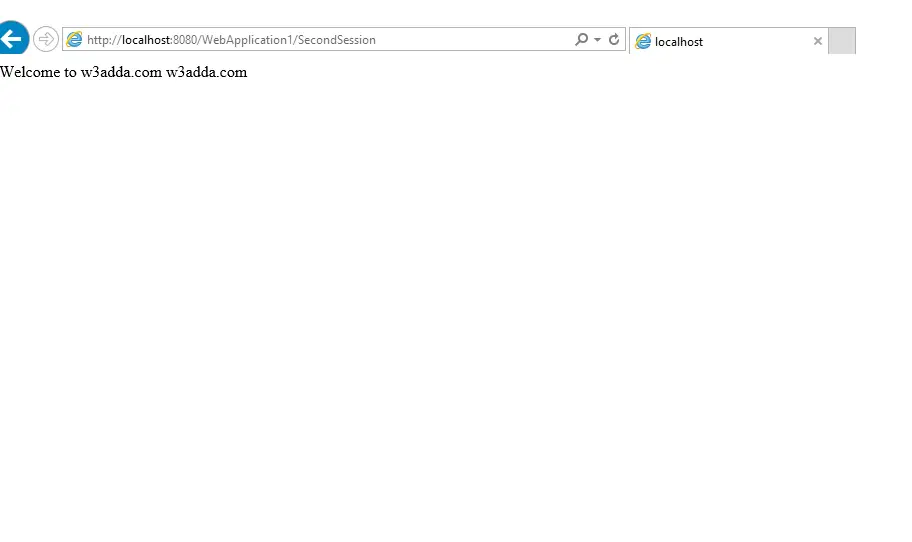In this tutorial you will learn about the Servlet HttpSession and its application with practical example.
Servlet HttpSession Interface
This interface provides a way to identify the user. Servlet container uses this interface for the creation of session between HTTP client and HTTP server. HttpSession can perform binding of objects, also it can be view and manipulate information of session.
HttpSession Interface Methods
There are some important methods which are used in this interface.
HttpSession getSession(): This method returns the current session which is associated with this request.
HttpSession getSession(Boolean create): This method returns the current session which is associated with this request when it Boolean value is false, it create new when it is true.
void setAttribute(String name, String value): This method is used to set the attribute in session.
lang.Object getAttribute(String name): This method is used to return the value of given parameter from session.
lang.String getId(): This method is used to returns the string of session unique identifier.
void invalidate(): This method Invalidates this session then unbinds any objects bound to it.
Long getLastAccessedTime(): This method returns the last time the client sent the request associated with this session.
Long getCreationTime(): This method returns the time when this session was created.
Example:-
Let’s understand it by an example.
index.html
This will be our welcome file from which we will send the user name.
|
1 2 3 4 5 6 7 8 9 10 11 12 13 |
<html> <head> <title>W3adda.com</title> <meta charset="UTF-8"> <meta name="viewport" content="width=device-width, initial-scale=1.0"> </head> <body> <form action="FirstSession"> Name:<input type="text" name="userName"/><br/> <input type="submit" value="go"/> </form> </body> </html> |
FirstSession.java
From this servlet we will store our session from below method.
|
1 2 |
HttpSession session=request.getSession(); session.setAttribute("uname",n); |
Check below code for this servlet.
|
1 2 3 4 5 6 7 8 9 10 11 12 13 14 15 16 17 18 19 20 21 22 23 24 25 26 27 28 29 30 31 32 33 34 35 36 37 38 39 40 41 42 43 44 45 46 47 48 49 50 51 52 53 54 55 56 57 58 59 60 61 62 63 64 65 66 67 68 69 70 71 72 73 74 75 76 77 78 79 80 81 82 83 84 85 86 |
package SessionMangment; import java.io.IOException; import java.io.PrintWriter; import javax.servlet.ServletException; import javax.servlet.http.HttpServlet; import javax.servlet.http.HttpServletRequest; import javax.servlet.http.HttpServletResponse; import javax.servlet.http.HttpSession; public class FirstSession extends HttpServlet { /** * Processes requests for both HTTP <code>GET</code> and <code>POST</code> * methods. * * @param request servlet request * @param response servlet response * @throws ServletException if a servlet-specific error occurs * @throws IOException if an I/O error occurs */ protected void processRequest(HttpServletRequest request, HttpServletResponse response) throws ServletException, IOException { response.setContentType("text/html;charset=UTF-8"); } // <editor-fold defaultstate="collapsed" desc="HttpServlet methods. Click on the + sign on the left to edit the code."> /** * Handles the HTTP <code>GET</code> method. * * @param request servlet request * @param response servlet response * @throws ServletException if a servlet-specific error occurs * @throws IOException if an I/O error occurs */ @Override protected void doGet(HttpServletRequest request, HttpServletResponse response) throws ServletException, IOException { processRequest(request, response); try{ response.setContentType("text/html"); PrintWriter out = response.getWriter(); String n=request.getParameter("userName"); out.print("Welcome "+n); HttpSession session=request.getSession(); session.setAttribute("uname",n); out.print("<a href='SecondSession'>visit</a>"); out.close(); }catch(Exception e){System.out.println(e);} } /** * Handles the HTTP <code>POST</code> method. * * @param request servlet request * @param response servlet response * @throws ServletException if a servlet-specific error occurs * @throws IOException if an I/O error occurs */ @Override protected void doPost(HttpServletRequest request, HttpServletResponse response) throws ServletException, IOException { processRequest(request, response); } /** * Returns a short description of the servlet. * * @return a String containing servlet description */ @Override public String getServletInfo() { return "Short description"; }// </editor-fold> } |
SecondSession.java
From this servlet file we will get the session data with the help of below code.
|
1 2 |
HttpSession session=request.getSession(false); String n=(String)session.getAttribute("uname"); |
Check below code of this servlet file.
|
1 2 3 4 5 6 7 8 9 10 11 12 13 14 15 16 17 18 19 20 21 22 23 24 25 26 27 28 29 30 31 32 33 34 35 36 37 38 39 40 41 42 43 44 45 46 47 48 49 50 51 52 53 54 55 56 57 58 59 60 61 62 63 64 65 66 67 68 69 70 71 72 73 74 75 76 77 78 79 80 81 82 83 84 85 |
package SessionMangment; import java.io.IOException; import java.io.PrintWriter; import javax.servlet.ServletException; import javax.servlet.http.HttpServlet; import javax.servlet.http.HttpServletRequest; import javax.servlet.http.HttpServletResponse; import javax.servlet.http.HttpSession; public class SecondSession extends HttpServlet { /** * Processes requests for both HTTP <code>GET</code> and <code>POST</code> * methods. * * @param request servlet request * @param response servlet response * @throws ServletException if a servlet-specific error occurs * @throws IOException if an I/O error occurs */ protected void processRequest(HttpServletRequest request, HttpServletResponse response) throws ServletException, IOException { response.setContentType("text/html;charset=UTF-8"); } // <editor-fold defaultstate="collapsed" desc="HttpServlet methods. Click on the + sign on the left to edit the code."> /** * Handles the HTTP <code>GET</code> method. * * @param request servlet request * @param response servlet response * @throws ServletException if a servlet-specific error occurs * @throws IOException if an I/O error occurs */ @Override protected void doGet(HttpServletRequest request, HttpServletResponse response) throws ServletException, IOException { processRequest(request, response); try{ response.setContentType("text/html"); PrintWriter out = response.getWriter(); HttpSession session=request.getSession(false); String n=(String)session.getAttribute("uname"); out.print("Welcome to w3adda.com "+n); out.close(); }catch(Exception e){System.out.println(e);} } /** * Handles the HTTP <code>POST</code> method. * * @param request servlet request * @param response servlet response * @throws ServletException if a servlet-specific error occurs * @throws IOException if an I/O error occurs */ @Override protected void doPost(HttpServletRequest request, HttpServletResponse response) throws ServletException, IOException { processRequest(request, response); } /** * Returns a short description of the servlet. * * @return a String containing servlet description */ @Override public String getServletInfo() { return "Short description"; }// </editor-fold> } |
Output:-
Check output of this code.
Screen 1:-

Screen 2:-

Screen 3:-


